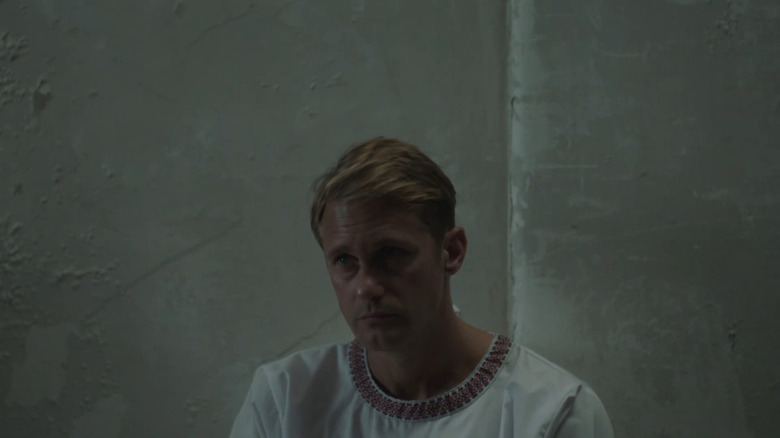
This post contains major spoilers for "Infinity Pool."
In Ernest Hemingway's 1926 novel "The Sun Also Rises," war veteran Jake Barnes, who has suffered an injury leaving him unable to have sex, tells a friend who's sleeping with his beloved, "You can't get away from yourself by moving from one place to another." In Thomas Wolfe's 1940 novel "You Can't Go Home Again," protagonist George Webber, a novelist, returns to his hometown after writing about it in a successful book. The novel's contents have outraged his old neighbors and family, appalled by what had secretly laid within George's psyche.
In Brandon Cronenberg's latest film, "Infinity Pool," writer James Foster (Alexander Skarsgård) learns about being caught between these two literary extremes in the most disturbing, humiliating, and embarrassing way possible. Now three films into his directing career, "Infinity Pool" further cements Cronenberg's auteurist signature style, his tropes, themes, and aesthetic. It also belongs to a long, proud line of boundary-pushing satire-thrillers that slam the wealthy, joining the ranks of Pier Paolo Pasolini's "Salò," Luis Buñuel's "The Discreet Charm of the Bourgeoisie" and even León Klimovsky's "The People Who Own the Dark."
Yet the biggest strength of "Infinity Pool" lies within its literal and figurative stripping of Foster, a stand-in for a typical masculine ideal. Like Hemingway, like Wolfe, and like so many other incisive artists, Cronenberg bursts the bubble of masculinity's egotistical self-image, and seems to wonder, through the film, if such a lesson will ever stick.
The Devil's Playground

"Infinity Pool" begins by chronicling the vapid day-to-day of the idle rich, chief among them James Foster and his beautiful wife, Em (Cleopatra Coleman). They're on vacation at an exclusive resort in the (fictional) country of Li Tolqa, a place of great natural beauty. James and Em sleep late, half-heartedly make plans for the day, and generally seem zombified by their vacation routine, all in the ostensible name of James looking to get his writer's groove back as he hasn't written a novel since his first failure of an effort several years ago.
James seems to wake up a bit upon meeting Gabi (Mia Goth), an actress on vacation with her real estate developer husband, Alban (Jalil Lespert). As James and Em begin to hang out with the couple, James finds himself drawn to Gabi in several ways, most prominently the fact that she purports to be a huge fan of his book, and her specialty also lies in failure; specifically, performing failure believably while acting in commercials.
Gabi and Alban take the Fosters on a getaway day trip to a secluded beach outside the resort, bribing a resort employee to let them borrow a car and leave the grounds, which tourists are forbidden from doing. While there, James gets his penis as well as his ego stroked by Gabi, and the foursome revel in their idle privilege — until that night, when James, driving back to the resort late at night, finds the car's headlights suddenly cutting out, whereupon he hits and kills a farmer crossing the road. Knowing the laws are disturbingly strict in the country, Gabi convinces everyone to leave the body and drive back, claiming she and Alban will explain things away in the morning.
A Tourist Trade
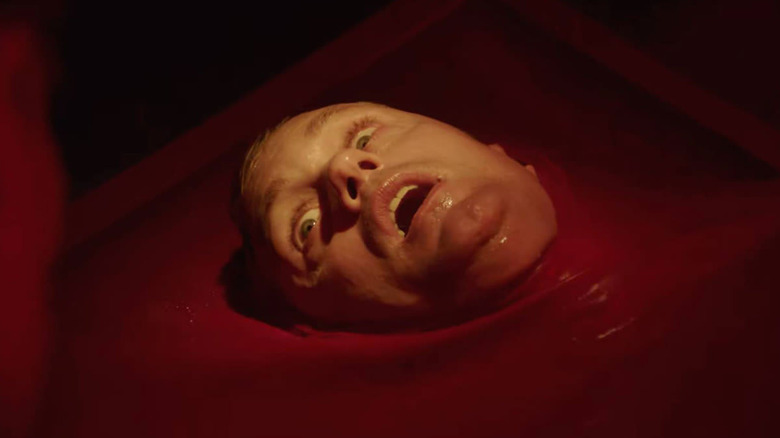
The next morning, however, James and Em are taken away to prison in a very third-world fascist fashion. After being separated from his wife, James is interrogated by Detective Thresh (Thomas Kretschmann), and it's here that Cronenberg unveils the film's sci-fi/body horror twist. Since murder, even manslaughter, is considered a capital crime in Li Tolqa, the highly religious and traditional community has a law that states that the man's next of kin must execute the perpetrator. However, in order for the country's tourist trade to remain unharmed, the authorities have developed a technology that provides an alternative (albeit for a sizable fee, which must be paid from an ATM while on site): the criminal will be "doubled," or cloned, so that the double may be publicly executed and the original can return to the resort. James chooses this option, goes through the humiliating and disassociating cloning process, and later when he awakens, witnesses the double's bloody death at his victim's young son's knifepoint.
Em watches the execution with James and is horrified at her husband's reaction. Rather than being upset or appalled, James is fascinated, even exhilarated by the experience. Finding his passport missing upon returning to the resort, James sheepishly tells Em they can't leave yet and is later summoned by Gabi to a secret meeting of other resort guests. These people reveal themselves as fellow "zombies," the elite who are wealthy enough to be able to afford to be "doubled" for their crimes multiple times over. They welcome James among their ranks and introduce him to an altogether unique pleasure of this vacation: committing increasingly dangerous and transgressive crimes, seemingly without consequence.
No Rules, Just Right
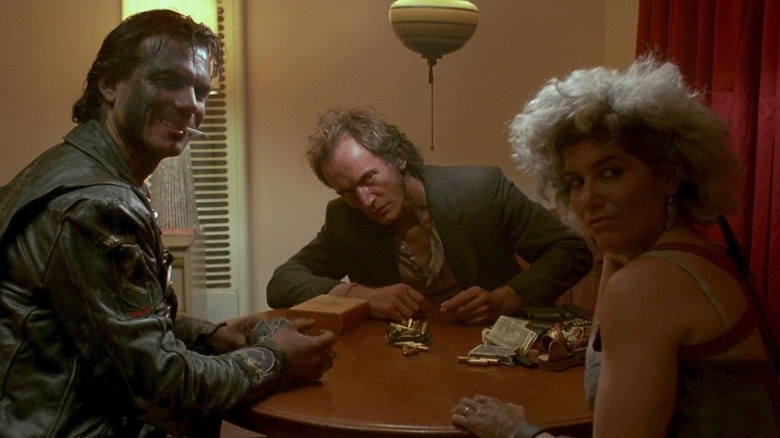
With this fantastically devilish "doubling" technology, "Infinity Pool" becomes a highly effective metaphor for the way the ultra-rich treat ethics and morality as a non-issue. James, Gabi, and the rest of the "zombies" get away with all manner of heists, brutality, assault, and harassment because the consequences won't be theirs; in fact, the execution of their doubles becomes added entertainment for them rather than a disturbing deterrent. Even though James and company are referred to as the walking dead, in horror terms, they're like the ugly Americans from the "Hostel" films who get to be on both sides of the torture, both victim and perpetrator. They hew even closer to vampires, the group resembling the similarly hedonistic gangs of "Near Dark" and "The Lost Boys" in their behavior.
Much like those examples, Gabi and the zombies have their own type of rationale for their bad behavior, treating it like a chic self-improvement exercise, because how can one really know themselves and what they're capable of unless all consequences are removed? Em, for one, doesn't appear to subscribe to such flimsy rationalizations for the gang's almost NC-17-rated orgies, telling James he's "gone wrong around the eyes" and leaving him. James isn't sad to see her go, instead diving further into depravity with his new community.
The group continues to abuse the locals in more ways than one; where the film begins with the Li Tolquans demonstrating their beliefs and practices as a bit of cultural entertainment for the tourists, the zombies make use of the locals' traditional masks and wear them while raiding private homes and institutions, as well as take a Li Tolqan religious drug and do it recreationally.
Purple Haze-Ing Ritual
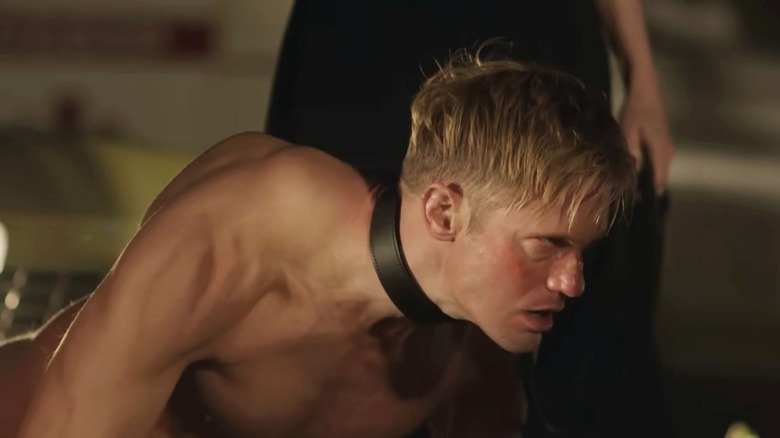
During one raid on a Li Tolqan hospital facility, the zombies abduct Detective Thresh, having deduced that he is holding James' passport so that the latter must remain in the country. Taking him back to the resort, the gang encourages James to beat, degrade, and humiliate the Detective while he wears a bag on his head. Only, after the bag is removed, they reveal that James has actually been abusing another one of his doubles.
This kicks off James' well-founded paranoia that the group does not have his best interests at heart, seemingly paying off what his previous drug-induced hallucinations have hinted at. Removing his passport from beneath the bathroom sink of his room which he placed there himself, James tries to leave for home, only for Gabi and the zombies to chase him down and force him back to the resort at gunpoint. Wounded while attempting to escape the gang, James runs through the woods and finds himself collapsing outside a remote farm, which may or may not be the home of the man he'd run over accidentally days earlier.
The gang turns up outside the farm with James' double, who they refer to as a dog, and insist that the "sucky baby" James must kill the double himself. James refuses, but the double attacks him, and in the scuffle James beats his own double to death with his bare hands. Gabi tenderly holds him while he suckles at her breast, smeared with the blood of his double. It appears that much of, if not all of the events of James' vacation were one big test, a game for the zombies to play to mess with James and see if he would "pass" by becoming one of them.
Can't Run Away From Yourself
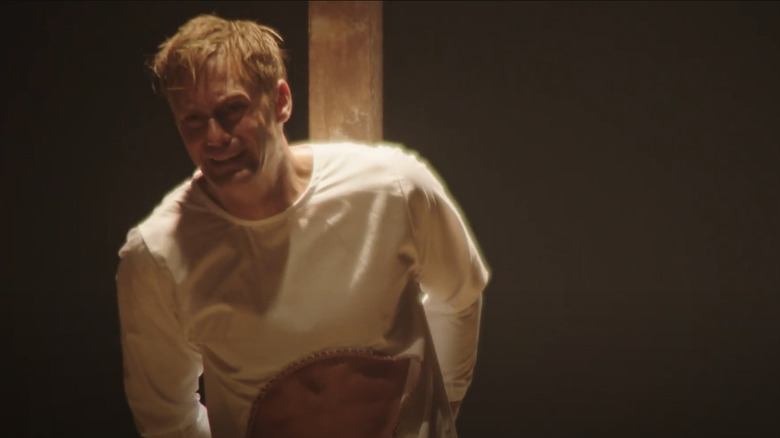
Did James pass, however? Was that even a possibility, or was the torture, humiliation, and ultimate revelation the point? And what, if anything, has he learned about himself?
When James first meets the zombies, one of them brings up the notion that many savvy audience members are thinking about as soon as Brandon Cronenberg's twist drops: how does James, or any of the gang, know that they're the original? How many doubles of them exist, anyway? The title "Infinity Pool" refers to the reason Gabi and Alban originally got in trouble with the Li Tolqans, where the construction of a pool for a new resort went wrong and resulted in some accidental deaths. It also refers to the type of pool itself, an optical illusion that seems to indicate to the naked eye that there is no horizon when, in fact, there exists a definite ending, a certain limit to the pool.
With "Antiviral," "Possessor," and this film, Cronenberg's thematic focus seems to be a skewed response to his famous father: where David Cronenberg's movies are rampant with self-destruction, Brandon's films concern the destruction of the self, a redefinition, and sublimation of identity. James doesn't know who he is, hence his failure as an author.
Gabi and the zombies perceive this as a fault in James' masculinity, pegging Em (who married James for no better reason than to get back at her father) as a woman who has sapped his virility. On the outside, James is the perfect male specimen: handsome, rich, and in shape. Cronenberg seems to say that James' failing isn't being a whipped wimp, but is instead a result of his emptiness: he's all surface, no depth, like Vincent or Roger O. Thornhill, like an infinity pool. In essence, a clone even before he's been doubled.
Was It Fate?

Brandon Cronenberg provides a tantalizing number of ambiguous hints that there's far more going on behind the scenes. Even though Gabi and the zombies claim James' road accident was his own foolish fault, there's the sense that it could've been orchestrated by somebody. During James' orgy-and-drug-fueled hallucinations, he has visions of the zombies circling him wearing some sort of VR headsets, all while a demonic Em leads the pack. "Is this a dream?" the supposedly real Em wonders aloud as she leaves James in tears. How much of James' ordeal is real, anyway? And who's to blame?
In the end, the answers to those questions don't matter. James, having finally found himself and realized the depth of his failing (professionally as well as morally), can't merely get on a plane back home with the rest of the two-faced zombies. Instead, he remains at the empty resort during the country's rainy season, alone. James, like George Webber, can't go home again, and like Jake Barnes, can't get away from himself. He'll remain in Li Tolqa forever. Because, after all, that's where he died.
Read this next: Horror Movies You Don't Want To Miss In 2023
The post Infinity Pool Ending Explained: Vacation, Meant to Be Spent All Alone appeared first on /Film.
0 Commentaires